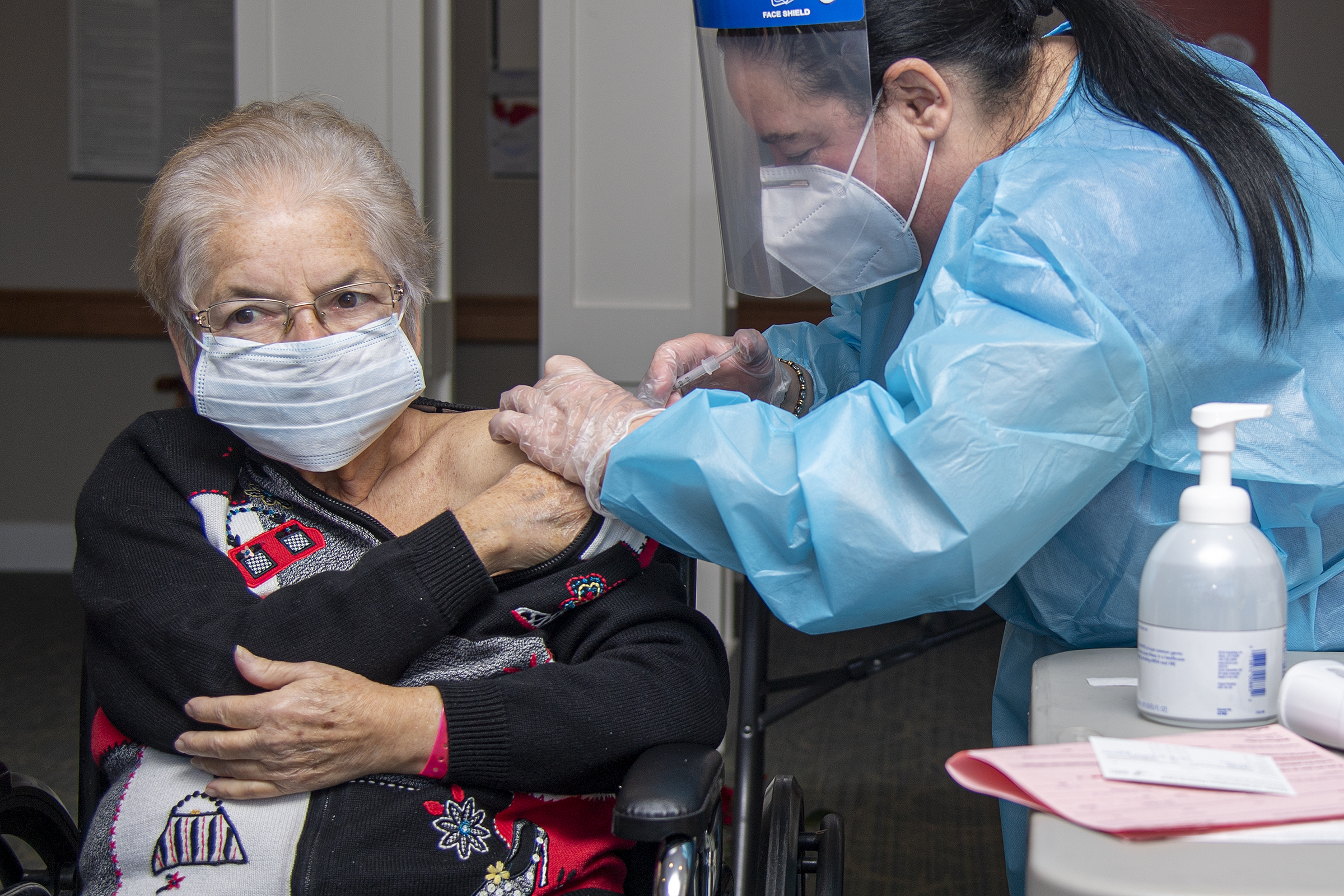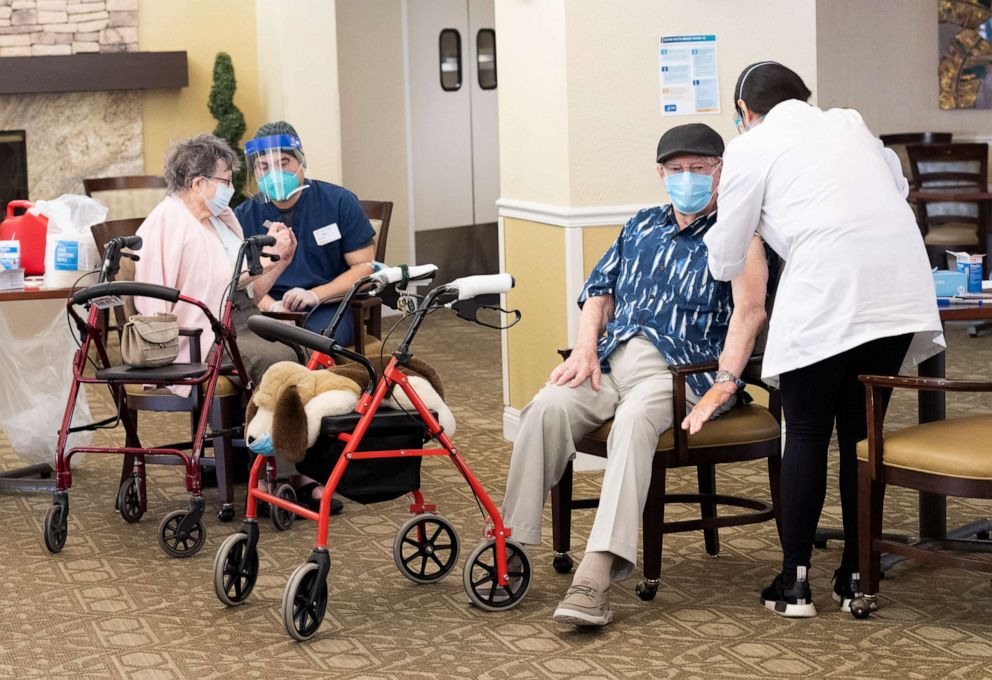Some nursing homes struggling to find takers for leftover vaccines
Distribution issues mean some facilities have extra doses that need reallocated.
As officials push to make sure there are enough COVID-19 vaccines to inoculate the nation's vulnerable long-term care residents, many nursing homes are facing the opposite challenge: how to make sure extra vaccine doses don't go to waste.
That's because a substantial number of nursing homes have fewer residents than estimated, say those involved in the vaccination process.
When the federal government calculated the number of doses that would be needed for nursing homes, they estimated that every facility was at 100% occupancy. But CVS and Walgreens, who are handling vaccinations at the majority of the nation's long-term care facilities, report that they're ending up with a significant number of extra doses left over.
"When we actually came on site, what we've learned is that many of the facilities aren't at 100% occupancy," said Walgreens Group VP of Pharmacy Rina Shah. "The numbers of individuals that are even there are less than what was initially reported."
Many facilities are actually at only 60-70% occupancy, said Shah.
To complicate matters, Shah told ABC News that Walgreens has been trying to contact facilities the day before they arrive to confirm the number of vaccines that will be needed, but that many times, small facilities don't respond when they reach out.
"They don't all respond and so there are times when we've called five to six times with emails and we're not able to get ahold of the facility," said Rina.
A spokesperson for CVS told ABC News that in many cases, both resident and staff projections provided by the facilities to the CDC were inaccurate.
"Allocations were based on long-term care facility bed counts multiplied by two to account for staff, " said T.J. Crawford, a spokesman for CVS. "But at most facilities, occupancy is far less than bed count, and staff uptake remains low."
In response, Crawford said that CVS is proactively asking states to "reclaim" allocations they don't need or defer making more allocations for the time being.

With extra doses available, states are trying to figure out where to allocate the leftover vaccines.
In an interview with ABC's Good Morning America, New Jersey Gov. Phil Murphy said that the federal long-term care (LTC) vaccination program is "literally putting aside doses" because they're not getting used -- but he provided assurances that doses are not being wasted.
"We're not throwing any doses away, I promise you that," said Murphy. "It depends on what day of the week you look at it, whether or not we've just gotten supply, et cetera, but we are putting as much -- as many shots in the arms as possible."
In Michigan, 120,000 doses of the Moderna vaccine that were not used are being sent to providers across the state, said Lynn Sutfin, a spokesperson for the Michigan Department of Health.
A spokesperson for the Arkansas Department of Health said the state estimates that approximately 30,000 doses are left over from the federal long-term care program. They told ABC News that the extra doses are being sent to Walgreens stores around the state to be given to Arkansans 70 or older and others who are eligible to receive the vaccine under the state's vaccination plan.
In Utah, the department of health's website says that as of Jan. 24, there were about 23,000 unused doses more than seven days old that were still viable and waiting to be administered by CVS and Walgreens. Vaccines can last up to six months if stored in ultra-low-temperature freezers, although common refrigeration units can only store the vaccine for up to five days.
"Some of these doses are likely on-hand in preparation for upcoming clinics this week," the website states. "However, it appears the federal government has allocated too much vaccine to these providers. Any doses above and beyond need to be transferred or diverted to other providers throughout the state that have the capability to get them into arms as quickly as possible."
A spokesperson for the Utah Department of Health told ABC News that the state has 8,775 doses from CVS and Walgreens that were diverted to local health departments for distribution.
In Texas, a spokesperson for the Department of State Health Services told ABC News that the agency has not finalized where doses not used by the federal LTC-pharmacy partnership program will be allocated, but that the CDC will advise the state how many doses are available for relocation, the spokesperson said.
A spokesperson for the Louisiana Department of Health told ABC News that the state is anticipating the potential for unused doses as CVS and Walgreens complete their clinics.
"Once the partnership is further along in these visits, we should get a better picture of the volume of unused doses and how we can allocate those back to other priority groups," said Kevin Litten, a Department of Health spokesperson.
Officials with advocacy organizations like the American Health Care Association and the National Center for Assisted Living (AHCA/NCAL) say they're concerned that vaccine doses will be wasted.
"These reports about potential vaccines going to waste are not unique to long-term care; they have occurred in hospitals and other settings as well," said a AHCA/NCAL statement provided to ABC News. "We call on governors and state public health officials -- who are in charge of vaccine distribution -- to provide guidance to pharmacies and health care providers about what to do when they have extra vaccine."

Part of the challenge, according to some long-term care advocates, is a lack of transparency about what's happening on the ground.
"The main thing that strikes us here is how little information we really have and how little we actually ... know about what's happening in individual facilities," said Robyn Grant, Director of Public Policy and Advocacy at the National Consumer Voice for Quality Long Term Care, a group that advocates for nursing home residents.
Although the CDC has a vaccination data tracker, it does not report numbers at the individual facility level. According to Grant, this has kept residents and their family members in the dark about where vaccinations have occurred and where they are needed.
"The information about what's happening would help shape distribution," Grant told ABC News. "Are there areas where they're struggling? Why are they struggling? What's going on, what needs to be done to remedy that? You're blind without data."
Dr. Josh Sharfstein of the Johns Hopkins Bloomberg School of Public Health told ABC News that the issue of unused doses "adds complexity to the supply chain."
"If the pharmacies can't use all their doses, they should make a plan with public health on what to do with them," Sharfstein said.
Dr. Mandy Cohen of the North Carolina Department of Health is urging long-term care facilities, hospitals and clinics to keep a waitlist from which providers can "call someone last minute" even if they are not in the priority category.
"Find the closest arm of who wants to get vaccinated and get that in because we as a state don't want to waste any vaccine," said Cohen.
"There are vaccines that are being wasted and that is a travesty," said Terry Fulmer, president of the John A. Hartford Foundation, a private, nonpartisan philanthropy dedicated to improving the care of older adults. "Even one dose wasted is too many."
ABC News' Dr. John Brownstein contributed to this report.




